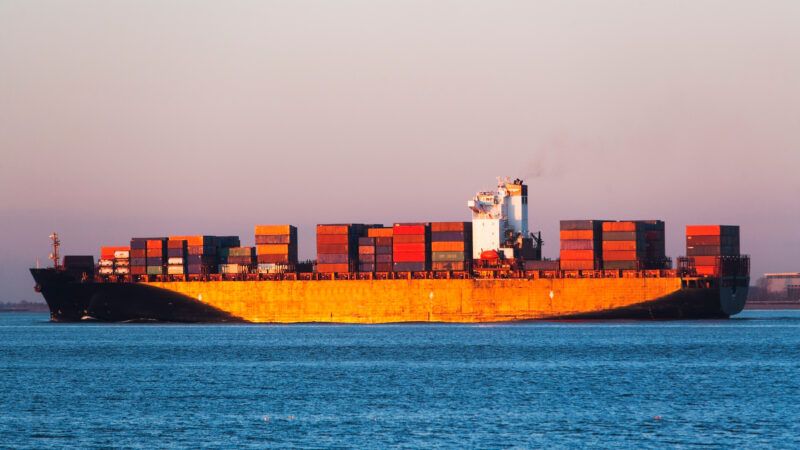In His Final Days, Is Trump's Approach to China Changing for the Better?
On his first day in office, Donald Trump tore up the Trans-Pacific Partnership. His administration is now seeking to put together something similar.

On literally his first week in office, President Donald Trump signed an executive order withdrawing the United States from the Trans-Pacific Partnership (TPP), a proposed 12-nation trade agreement that was a work-in-progress holdover from the Obama administration.
Now Trump might spend his final days in office trying to undo that initial mistake.
The Wall Street Journal reports that the latest Trump administration plan to confront China's unfair trade practices seeks to "create an informal alliance of Western nations to jointly retaliate when China uses its trading power to coerce countries." If China boycotts imports—as it recently did to Australian coal—or otherwise applies economic pressure to a trading partner, the allied nations would be able to execute a coordinated response. An unnamed administration official tells the paper that "the West needs to create a system of absorbing collectively the economic punishment from China's coercive diplomacy and offset the cost."
A collective, rather than unilateral, approach to pressuring China? Wow, things are getting really crazy in the Trump White House these days.
Creating an informal economic alliance to counterbalance China in the Pacific was, of course, one of the TPP's primary goals. Like all trade agreements, the TPP was not without its warts, but Trump's criticism of the proposed pact was rooted in ignorance. He railed against the TPP during the 2016 campaign, condemning it as a "horrible deal" that was "designed for China to come in, as they always do, through the back door and totally take advantage of everyone"—even though it was designed to do exactly the opposite.
Tearing up the never-ratified deal on his first day in office was not just a fuck-you to the Obama administration but a more broadly symbolic gesture. Trump was sending a signal that America would stand up to China one-on-one while seeking unilateral trade deals with some of the countries, like Japan, that would have been part of the TPP.
Four years later, it's safe to say that the Trump strategy has not succeeded. There have been a few small victories, of course, like the "phase one" trade deal that the U.S. and China inked late last year. But those wins are small potatoes compared to the overwhelming costs of Trump's go-it-alone strategy, which has foisted billions of dollars of tariff costs on American importers and consumers. The administration has spent $28 billion bailing out farmers hurt by the trade war—a massive self-inflicted wound. And that doesn't even get into the other damage caused by Trump's haphazard escalations of trade tensions with longtime U.S. allies.
It's far too late for the president to change course now, but there is a certain satisfying symmetry to this final shift in Trump's views on trade.
"Forming a large coalition of like-minded countries to confront certain Chinese trade and investment practices makes a lot of sense," says Clark Packard, a trade policy counsel with the pro-market R Street Institute. "The United States does not have sufficient market power alone to force substantial changes to Beijing's economic practices, but it can increase its leverage over such practices with a larger coalition."
President-elect Joe Biden supported the TPP as a member of the Obama administration, but he has sent mixed messages about how his incoming administration might approach some of these thorny trade issues. Still, he has signalled an interest in stepping back from Trump's go-it-alone formula. "We need to be aligned with the other democracies," Biden said at a press conference last week, "so that we can set the rules of the road instead of having China and others dictate outcomes because they are the only game in town."
Trading with other nations is, by definition, not something you can do by yourself. Whether coming from Biden or from the final days of the Trump administration, these are welcome signs that America is ready to put some of the economic foolishness of the past four years behind it.


Show Comments (57)